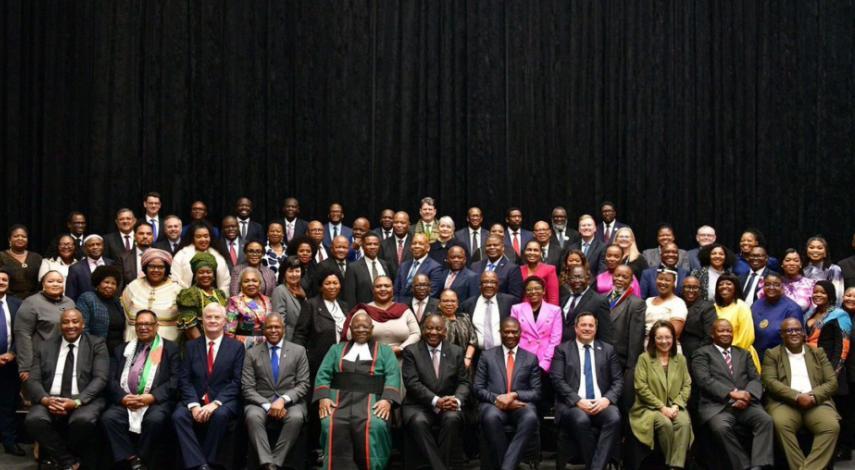Africa-Press – South-Africa. Since July 2024, South African taxpayers have spent over R202.5 million on ministerial and deputy ministerial travel, sparking renewed calls for urgent reform of executive perks.
Opposition party ActionSA, citing official parliamentary replies, confirmed that R202,589,406 has been spent in less than a year.
“This is a figure that will balloon as we await updated replies to our questions,” said ActionSA MP Alan Beesley, who is spearheading the party’s fiscal oversight efforts.
Speaking to BusinessTech, Beesley condemned the “out of hand spending” by government officials while ordinary South Africans face economic hardship.
“The government is talking about the fact that people need to tighten their belts, that there needs to be austerity measures in place, and now if the cabinet is not prepared to do it, how can you expect the rest of society to do it?” he said.
While acknowledging that travel is part of the job, Beesley criticised the frequency and luxury of such trips, calling the level of spending “totally absurd.”
“The reality is that it is currently most likely north of the R200 million mark, but this is what is confirmed,” said Beesley.
The party is backing the Enhanced Cut Cabinet Perks Bill, introduced by Beesley, to rein in the cost of governance in the executive.
The Bill revives a previous DA proposal that lapsed after they entered government and introduces tougher reforms, including:
Ending the President’s sole authority to amend the Ministerial Handbook.
Requiring oversight by Parliament and an independent commission.
Mandating transparency through public disclosure and regular reviews.
Beesley argues the changes could save taxpayers R1.5 billion annually and form part of ActionSA’s broader plan to abolish deputy ministers altogether.
ActionSA MP Alan Beesley with the Enhanced Cut Cabinet Perks Bill
Expensive trips
Among the most striking examples he cited is Sports, Arts and Culture Minister Gayton McKenzie’s R4.8 million in international travel costs.
McKenzie defended the expense, saying flying business class was necessary to avoid illness on long flights.
This included R488,495 in travel and accommodation for a receptionist who accompanied the Deputy Minister to both the Olympics and Paralympics.
Beesley contrasted this with his own experience in the private sector: “I never travelled with a secretary and opted for economy class and modest accommodation.”
He added that some athletes miss tours due to a lack of funding, while staff enjoy expensive overseas trips.
He also questioned the necessity of sending ministers to events like book fairs in Havana, when virtual options are available.
Public outrage intensified after it was revealed that Deputy President Paul Mashatile and his wife spent R956,057 on a four-day hotel stay in Japan, funded by taxpayers.
“These are just some examples of reckless and out of touch spending. So many houses could have been built for the needy, lasting them for life, with what they pay for a couple of nights. It’s absurd,” said Beesley.
Departmental spending breakdowns show International Relations and Cooperation leading with R21.63 million, followed by Human Settlements at R16.38 million, and The Presidency at R13.34 million.
Three departments, Land Reform, Social Development, and The Presidency, have yet to report figures for the period, while the Minister for Women, Youth and Persons with Disabilities failed to disclose her travel costs.
Travel expenditure since July 2024, except for Land Reform and Rural Development, Social Development, the Presidency, and Women, Youth and Persons with Disabilities.
South Africa’s huge cabinet and calls for reform
Repeated calls to trim South Africa’s bloated cabinet, including from President Cyril Ramaphosa himself and parties like the DA, have come to nothing.
The post-election Government of National Unity (GNU) has produced the largest executive in the country’s history.
Ramaphosa’s 2024 executive consists of 77 members, up from 65 previously. It includes:
The President.
The Deputy President.
32 Ministers.
43 Deputy Ministers.
Two new ministries and seven deputy positions were added with members from various parties, including ANC, DA, IFP, PA, PAC, UDM, FF Plus, AL Jama-ah, and GOOD.
Data compiled by journalism outlet The Outlier shows South Africa’s cabinet is nearly double the size of Germany’s.
This is despite having a significantly smaller population (60 million vs 84 million) and an economy worth less than 10% of Germany’s $4 trillion GDP.
While South Africa’s executive is smaller than those of China, India, or Brazil, those countries have far larger populations and economies to match.
ActionSA has slammed the expansion, calling the executive’s scale and spending “unsustainable and indefensible.”
It maintains there “should not be more than 20” ministers, warning that overlapping roles breed “absolute confusion.”
“There are just too many captains on the board and nobody actually is responsible for anything,” Beesley said.
“The smaller you make it, the more accountability there would be. It’s a win-win on several fronts.”
For More News And Analysis About South-Africa Follow Africa-Press






